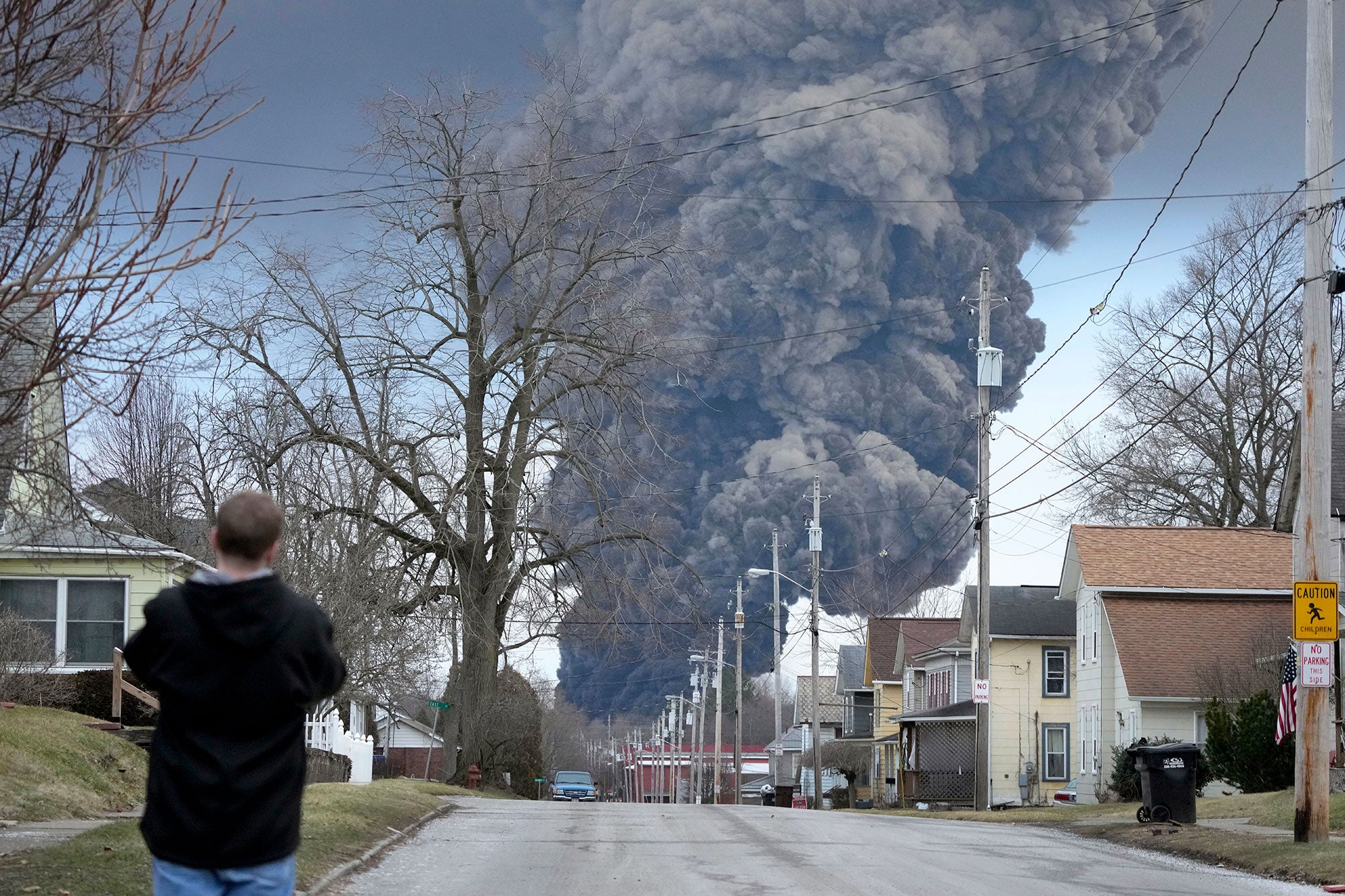Earthjustice goes to court for our planet.
We’re here because the earth needs a good lawyer.
How a Train Derailment Led to a Major Chemical Disaster in Ohio
This page was published 3 years ago. Find the latest on Earthjustice’s work.
More than a week after a train derailed and blew up on its way through an Ohio town, residents there are still waiting for information. The train carried vinyl chloride, a toxic substance. The extent of chemical contamination and what long-term impacts it could have on the health of residents around the town of East Palestine remain unknown. Here’s what we do know now and what officials should do to help the people affected by this disaster.
What happened in East Palestine?
- A train carrying hazardous and carcinogenic chemicals derailed and exploded, contaminating nearby waterways, soil, and air.
- The hazardous chemicals have spilled into the Ohio River, which touches six states and provides drinking water to more than 5 million people.
- Residents have reported experiencing nausea, shortness of breath, dizziness, and headaches.
- Despite the EPA’s greenlight for residents to return home a week after the explosions, the agency cannot determine the incident’s long-term health consequences.
What should be done about the Ohio chemical disaster now?
- It is critical that Ohio Gov. Mike DeWine declare a state of emergency and formally request FEMA aid so that residents affected by the explosion can get immediate help.
- State and federal officials should listen to the needs of the people most impacted as they seek to address this chemical disaster. Local organizers include Freshwater Future, Breathe Project, Save Our County, Junction Coalition and River Valley Organizing.
- “Our valuable waters, such as the Ohio River and the Great Lakes, must be better protected from the threats to the safety of our drinking water from transporting hazardous chemicals,” says Jill Ryan, the executive director of Freshwater Future.
What steps can leaders take to prevent similar catastrophes?
Stopping the petrochemical boom
- The train was carrying petrochemicals, which are toxic substances derived from oil and gas that are used to make paint, adhesives, plastics, and other products.
- As the clean energy transition threatens Big Oil’s bottom line, the industry is looking to offload oil and fracked gas and build up its profit margins by turning to petrochemical production. It is planning a build-out of petrochemical facilities in the Ohio River Valley and Gulf Coast regions.
- Earthjustice is partnering with communities that are rising up to stop the petrochemical build-out in their neighborhoods. We are working in Washington, D.C., to pause permitting and stop federal funding for petrochemical facilities, and we are advocating for stronger regulation of toxic chemicals made from oil and gas to protect community health.
Restoring commonsense safety provisions for trains
- Adequate safety requirements for trains can also help prevent future disasters. In 2018, the federal agencies charged with regulating hazardous materials on trains actually removed safety rules requiring modern electronic braking systems. This change lets explosive tank cars with braking technology from the 19th century continue to travel through towns and neighborhoods.
- A spokesperson for the federal agency investigating the East Palestine derailment confirmed that the Norfolk Southern train did not have an electronic braking system, which experts say likely would have reduced the damage caused by the derailment.
- Earthjustice appealed the 2018 safety rollback, but the government failed to respond, siding with companies like Norfolk Southern, which lobbied against more stringent safety requirements.
- Since the trail derailment, we have renewed our challenge to the U.S. Department of Transportation’s 2018 safety rollback. The DOT has announced a plan to improve rail saftey, including updating rules to better regulate hazardous trains and cargo.
“While we still don’t know the full extent of human exposure and health effects from this derailment, it is an urgent call to action for EPA and other federal agencies to undo Trump-era rollbacks and strengthen rules that protect communities from petrochemical facilities’ toxic emissions,” says Earthjustice senior attorney Adam Kron.
If you’d like to report incidents stemming from this disaster, please use this form from our partners at River Valley Organizing.
